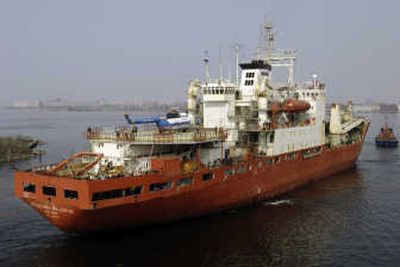Russians hope to claim Arctic Ocean seabed

MOSCOW – Russian scientists hope to plunge to the seabed beneath the North Pole in the next few days in a miniature sub and plant a titanium capsule containing the Russian flag, symbolically claiming much of the Arctic Ocean floor for Moscow.
Thick sea ice threatens to thwart the expedition, an engineer with Russia’s premier polar research institute said Friday. But if the effort succeeds, it could mark the official start of a very cold diplomatic war for the Arctic, one of the Earth’s last energy frontiers.
A convoy consisting of a research vessel and an icebreaker, and led by Russia’s most famous polar explorer, set sail Tuesday from Murmansk toward the North Pole – shadowed, according to Russian TV reports, by at least one Norwegian military aircraft.
On Saturday, Russian researchers expected to perform test dives to depths of over a mile in two miniature subs near Franz Josef Land, a Russian archipelago in the Arctic Ocean.
The expedition, supported by the Kremlin, was dispatched to buttress Russia’s claims to more than 460,000 square miles of the Arctic shelf – an area that by some estimates contains 10 billion tons of oil and gas deposits. Experts say it’s part of Russia’s long-range efforts to expand its energy empire.
Arkady Soshnikov, chief engineer of Russia’s Arctic and Antarctic Scientific Research Institute in St. Petersburg, said this year’s unusually thick sea ice could hamper the expedition.
While the nuclear-powered icebreaker Rossiya is capable of pushing through most pack ice, Soshnikov said, the research vessel Akademik Fyodorov may have trouble following. Still, the current plan calls for the mini-subs to descend to the seabed under the North Pole on Monday or Tuesday, he said.
Despite this summer’s conditions near the pole, the area of the Arctic Ocean covered by ice has been shrinking since the early 20th century and the change has accelerated in the past decade, according to the U.S. National Oceanic and Atmospheric Administration. Some scientists blame the shrinkage on the effects of human-driven climate change.
As the Arctic’s ice recedes, its waters are becoming more navigable – and its riches more accessible to a resource-hungry world.
The largely unexplored Arctic seabed could contain vast oil and gas deposits; the recoverable petroleum reserves of several countries that claim the shores of the northern polar ocean – including the U.S., Russia and Norway – are rapidly being exhausted.
About 100 scientists on the Akademik Fyodorov are looking for evidence that the Lomonosov Ridge – a 1,240-mile underwater mountain ridge that crosses the polar region and connects Russia and Greenland – is a geologic extension of Russia and can therefore be claimed by it under the U.N. Convention on the Law of the Sea.
President Vladimir Putin considers the expedition “very important,” Kremlin spokesman Dmitry Peskov said. “Being a unique scientific expedition it is of course supported by the president.”
The Kremlin, he added, is well aware of the territorial implications of the research. “Besides being of scientific importance, of course we will wait and see the results of that expedition, whether they determine that the bottom is a continuation” of the Lomonosov Ridge, he said.
Moscow has claimed the polar region since at least the days of the Bolsheviks and argued that the geological data backed up this claim in 2002 in an application to the U.N. committee that administers the Law of the Sea. The U.N. rejected Moscow’s application, citing a lack of evidence.
Russia is expected to go back to the U.N. in 2009 with data from its recent expeditions.
Emboldened by surging oil revenues, the Kremlin has in recent years revived the Soviet-era practice of direct economic, scientific and geopolitical competition with the West. In the case of the Arctic seabed, at least, some nations seem ready to respond in kind.
Denmark’s scientists hope to prove that the Lomonosov Ridge is an extension of the Danish territory of Greenland, not Russia.
Thorkild Meedom of Denmark’s Ministry of Science, Technology and Innovation said Canadian and Danish scientists on two icebreakers are now conducting mapping studies of the north polar sea.
“We’re going step by step and mapping as conditions permit,” Meedom said.
Nations that border the Arctic are concerned about security as well as energy. The U.S. Navy and Coast Guard co-sponsored a symposium in Washington this month titled “The Impact of an Ice-Diminishing Arctic on Naval and Maritime Operations.”
And Canadian Prime Minister Stephen Harper said earlier this month that Canada plans to spend $7 billion to build and operate up to eight Arctic patrol ships.
Russia’s current push to the pole is being led by Artur Chilingarov, 68, perhaps the nation’s most famous living Arctic and Antarctic explorer and deputy speaker of the lower house of parliament. He was named a Hero of the Soviet Union for leading a 1985 expedition in the Southern Ocean, in which his vessel became locked in sea ice.
Chilingarov’s expedition to map the Lomonosov Ridge is the second by Russia in recent months.
About 50 Russian scientists spent six weeks mapping the Arctic seabed this spring, and returned in June to say they had confirmed Russia’s claim to the region.
Viktor Posyolov, a leader of that expedition, said that dropping the Russian flag under the Arctic doesn’t have much practical significance, since the contest for the region will be played out in lengthy scientific studies and U.N. debates.
“It means nothing,” said Posyolov, deputy director of the Institute of World Ocean Geology and Mineral Resources of the Ministry of Natural Resources.
While some scientists predict the Arctic will contain vast reserves of oil and natural gas, Posyolov said no know one really knows for sure.
“There are no proven resources,” he cautioned, adding that the technology needed to exploit any such resources has yet to be developed.
“This is a question for several generations after us.”